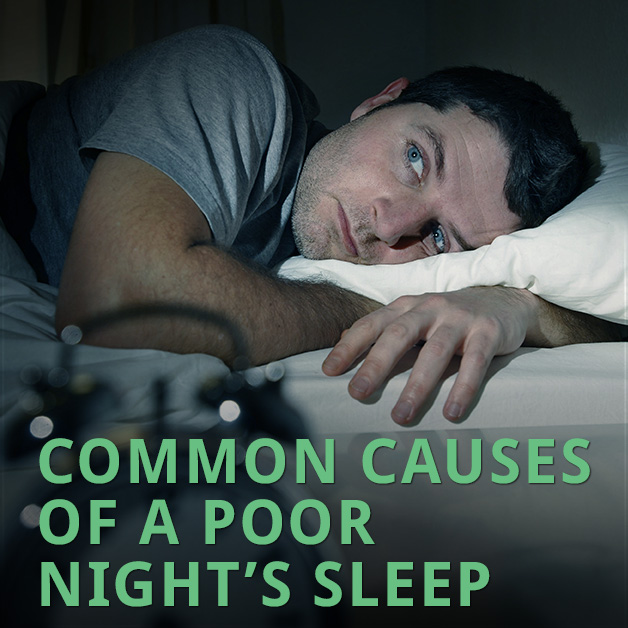
01 Apr Common Causes of a Poor Night’s Sleep
In the United States, roughly 40 million individuals suffer from a sleep disorder. In addition, another 20 million Americans have an acute sleeping problem. Unfortunately, sleep is not something that can be skipped or left to chance. In order to perform at an optimal level through the work day, most adults need anywhere from seven to nine hours of sleep a night. For those who struggle to get to or stay asleep, seven to nine hours can be elusive, and that can become not just frustrating but also detrimental to your health.
Sleep disorders are defined as health challenges where an individual consistently struggles to get to or stay asleep, leading to fatigue, exhaustion, and overall grogginess. In addition, sleep disorders can cause a variety of other health problems and symptoms that can lead to even more difficulties in your life. Sleep disorders can cause changes in mood, increase irritability, stress your immune system, and even widespread pain.
If you discover that you have a disorder or simply have trouble snoozing and need help, a doctor can help you to figure out what is causing your disorder and what you need to do about it. There are many different causes for lack of ability to repose. For some common causes of disorders, you may find that SLEEPSolve 24/7 is the right natural, non-addictive supplement that you need to get a restful night’s sleep.*
What are common causes of insomnia according to the National Sleep Foundation?
Anxiety and Depression
Anxiety and depression can wreak havoc on your sleep cycle. While you may find yourself napping more with depression, depression can make it hard to sleep regular hours. Insomnia can make depression worse, making it a cycle that is exceptionally hard to break out of.
Anxiety is also a common factor in many sleep disorders. Regular worrying, tension, and overstimulation can make getting to sleep extremely difficult, which in turn makes it difficult to relieve anxiety.
Your Lifestyle
There are several lifestyle choices that can have a big impact on your shut-eye. Watching TV in bed or working from home in the evening are all lifestyle habits that can disrupt your schedule. Creating a beneficial sleep schedule and sticking to a regular schedule can help in general. This includes cutting out electronics before bed, and going to bed and getting up at consistent times.
Certain Foods
Food can also play a big factor in your ability to get to sleep and stay asleep. Don’t eat right before you head to bed and avoid caffeine outside of morning hours. These can make a big difference in your ability to fall asleep at night. You should also be careful with alcohol consumption, as it can cause you to have disruptions once you fall asleep.
Figuring out what is causing you to get a poor night’s rest and what works for you to improve not just your ability to get to sleep, but to stay asleep, can make an incredible difference in your quality of life.

